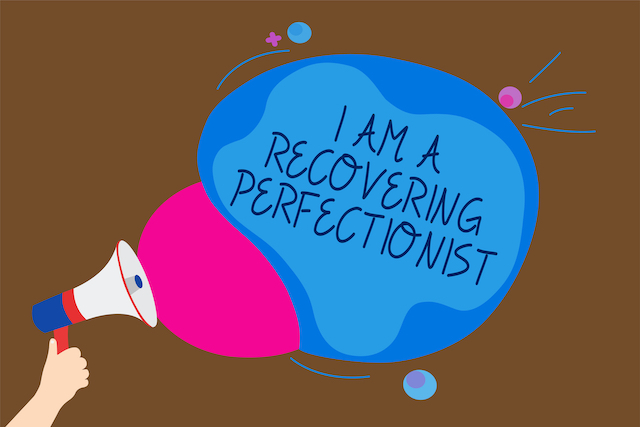In 2016, the number of people estimated to be suffering from mental health issues like depression and anxiety amounted to roughly 1.1 billion. Since then, numbers have likely continued to rise. Moreover, studies have also shown women especially on average are a) more likely to suffer from mental health issues, and b) less likely to talk about them. The taboo in Pakistan surrounding depression and anxiety disorders only serve to aggravate the individuals suffering even more. For the women who cannot seek out full time therapy, we’ve enlisted the help of a trained therapist. You sent us in your questions – here are the answers!

“Perfectionism and over-thinking are my two vices. I’ll notice the minutest thing that’s wrong with something, and feel the need to fix it. I don’t do so many things in life because unless I can do them perfectly, I feel like there’s no point in doing them. I am not a control-freak, but I can never do anything half-way and that puts a lot of pressure on me. I also know it’s holding me back in life from new experiences that could be good for me. How can I be better with this?”

Shahrukh’s Response:
Dear Anon,
Perfectionism and overthinking are two things that can go hand-in-hand more often than not. While cognitively there might be an understanding of its drawbacks in one’s day-to-day life, it can also feel like a compulsion. Both things stem from something much deeper, and each person will have their own history. Let’s explore this further and see what can be done.
Perfectionism: Internal Drive Or Fear Of Failure?
There is nothing wrong with having the drive to do something well, and with excellence. It could be part of your inner motivation, as well as your curiosity and desire to master your craft. That being said, perfectionism can sound very similar, but there is one crucial difference: the way in which one responds to themselves.
In the former scenario, one is driven to excel, but is willing to allow mistakes and learn from them. Alternatively, in the latter scenario, one will not allow themselves to make a mistake – they will be so hyper focused on the idea of getting everything perfect that the idea of a mistake is one that’s terrifying, and can be a source of anxiety.
In the case of perfectionism, because there is such a great amount of pressure from the impossible standard set, one can find themselves stuck in a loop of anxiety and fear.
So, what’s going on there? What is it that’s creating this loop?
“I Have To Get It Right, It’s All Or Nothing”
What tends to happen in the face of perfectionism is a great deal of definitive statements that tie in directly to one’s inner world and sense of self. Meaning that they feel that their actions are reflective of who they are. Examples of negative self-talk can include:
- “If I don’t do this right, I’m a complete failure”
- “I need to complete this task or I am incompetent.”
- “If I do badly on my evaluations, I will never be able to look my co-workers in the eye.”
These statements convert action into negative self-evaluations. In order to avoid this, a perfectionist will spend twice as long on a task, double-checking each and every detail or even suffer from chronic procrastination as a way of avoiding the feelings of anxiety or negative self-talk. In order to counteract the shame that one feels from “failure” of doing a task perfectly, it would help to reframe one’s thought process, and to change the relationship one has with mistakes.

“Everybody Makes Mistakes, Everybody Has Those Days”
When I was younger and felt like the weight of imperfection and shame was sinking down on me, I would blast “Nobody’s Perfect” from Hannah Montana. Fast forward many years later and I still find myself doing that from time to time. Strangely enough, the lyrics more or less summarise what I try to remind myself:
- Everybody makes mistakes.
- Nobody’s perfect.
- You live and you learn.
- You mess up sometimes, nobody’s perfect.
The idea is to remind yourself that at the end of the day, you are human, and that learning comes from mistakes, and in the process of growing, we will get many things wrong. One of my mentors and supervisors would use the term “growing edges” instead of mistakes, or even the term “opportunities for growth”, and it really brought into perspective as to how much weight there is in the word “failure”.
In addition, it’s worth reflecting on the purpose of focusing on smaller details, and wondering what the worst it is that could happen, and even if the worst were to happen, would you be able to survive it? More often than not, in cases of perfectionism, the answer to the last question is yes.
It might be a challenging task to change one’s default line of thinking, merely for the fact that it happens almost instantly. However, what one can do is intervene when such thoughts come up. This can be done by offering alternate thoughts:
- “I can learn from my mistakes.”
- “I am only human.”
- “It is impossible to get it right every time.”
- “Mistakes have no bearing on me and my self-worth.”
Anon, when it comes to perfectionism and overthinking, the bottom line is to try to bring focus away from thoughts that might be negative and definitive to those that are more realistic and positive; as well as being kinder to yourself in the face of mistakes/growing edges. You are more than your perfectionism, and you are certainly more than your mistakes. Remember that. I do hope that this article was helpful to you, Anon. If you feel that you need to explore this issue any further, I would recommend seeking out the help of a psychotherapist/counsellor. I wish you all the best on your journey towards healing. Take care and stay in your power!

The above article is written by Shahrukh Shahbaz Malik who is trained in humanistic integrative counselling at CPDD in the UK and currently has her own private practice in Karachi. The views expressed in this article are those of one expert. They do not necessarily represent the views of Mashion, nor do they represent the complete picture of the topic at hand. This article is for informational purposes only and is not a substitute for medical diagnosis, treatment or therapy.








What do you think?
You must be logged in to post a comment.